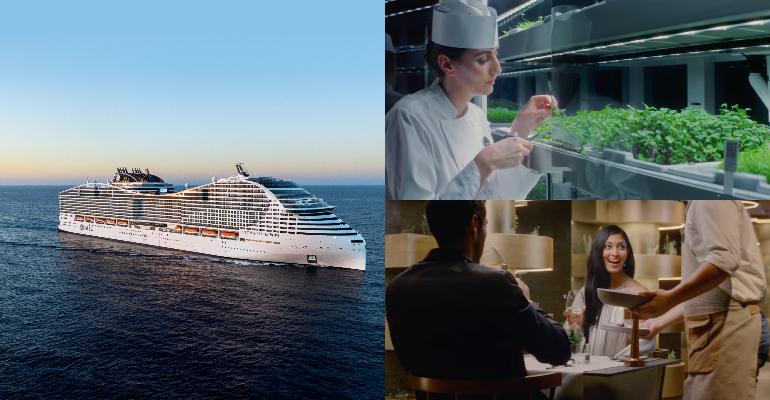‘Discover the future of cruising’ will roll out in more than 30 countries and include TV, out of home, print media, digital and social media, showcasing the fleet's environmental performance and sustainable technologies.
The ad offers glimpses of life onboard an MSC Cruises ship, from its shows and entertainment to its restaurants.
‘Already cruising is one of the best holiday options on offer for consumers today, but many of our guests don’t realise that it has important sustainability aspects as well,’ explained Pierfrancesco Vago, executive chairman, cruise division, MSC Group.
‘We have long had a steadfast focus on sustainable and environmentally responsible business practices and on protecting guests, employees and the communities in which we operate.
‘Today more than ever, brands like MSC Cruises recognise the vital importance of the environment, and a healthy and viable planet and this is why we think it is important for us to take a leadership role and make our sustainability commitments a key element of our discourse with consumers and overall society.’
He added, ‘Sustainability at MSC Cruises is central to the brand’s DNA and the way we operate as a business.’
MSC World Europa goes centre stage
The TV spot asks viewers, ‘Can cruising ever reach zero emissions? We think it can, and we’ll keep asking questions until it does.’ It captures MSC Cruises’ most environmentally advanced ship to date, MSC World Europa, which entered service in November. As well as some of the ship’s environmental technologies and solutions going under the spotlight, the campaign demonstrates the progress made across the brand’s fleet of 21 vessels when it comes to sustainability. From fuel and food, to recycling and plastic, it focuses on a number of areas where there is potential to become ever greener.
Explained Vago, ‘We have been investing heavily, for many years, in solutions and technologies that continuously and progressively reduce our environmental footprint. From 2017 to 2023, we invested more than €8b in a more modern and efficient fleet with 10 new vessels that have each been progressively more environmentally advanced than the last.
‘The new brand campaign for MSC Cruises is a vital tool to explain to consumers and other stakeholders how our commitment to sustainability is articulated on our ships and across our business and showcases how central it is to everything that we do.’
Recent achievements in green technology
Efforts by MSC’s cruise division have so far contributed to a carbon intensity reduction of 35% since 2008, putting it in good stead to meet the industry wide IMO target of a 40% intensity reduction by 2030. It is also moving steadily towards the long-term goal of hitting net-zero by 2050.
LNG paves the way for the adoption of low and net-zero carbon fuels, such as bio and synthetic-LNG, and ultimately green hydrogen, enabling the development of innovative technologies such as fuel cells, according to the line. MSC Cruises’ second LNG ship, MSC Euribia, will be delivered in June 2023 and the third, MSC World America, is currently being constructed and will be delivered in 2025.
On MSC World Europa, MSC’s cruise division is testing a solid oxide fuel cell technology which it plans on further advancing and scaling up on the use of in the future.
‘We have already virtually eliminated emissions like SOx and NOx from our operations and now we are focused on reducing carbon emissions with LNG,’ remarked the company’s VP sustainability and ESG, Linden Coppell.
‘It is the fuel with lowest carbon emissions available at the scale we need. We have already got one vessel using it and two more under construction with the third planned to incorporate new technology to minimise methane slip and thus further reduce overall greenhouse gas emissions when using LNG.
‘This is the first step in our journey that involves transitioning to LNG in the short-term, low carbon in the medium-term, and net-zero carbon fuels, including synthetic and bio-LNG and synthetic and bio methanol, in the longer-term.’
Coppell has previously spoken about lack of availability of low-carbon fuels in meaningful quantities, but said that MSC is helping accelerate their development and scaling through investments in more advanced ships and related environmental technologies.
‘With every new cruise ship built, MSC Cruises introduces and tests new technical solutions that can utilise these fuels thus providing the encouragement needed to fuel suppliers and governments responsible for provision by showing them that we are ready and hungry for low and net-zero carbon fuels.’
Hybrid Exhaust Gas Cleaning Systems (EGCS) are installed on the majority of ships of the fleet, which reduce sulphur oxide (SOX) emissions by 98%. Selective Catalytic Reduction Systems (SCRS) are installed on the newest ships, which reduce nitrogen oxide (NOX) emissions by up to 90%.
Shore power technology has been installed on all MSC Cruises’ new ships since 2017 and together with retrofits, covered 65% of the fleet total capacity at the end of 2022. Additional ships will be retrofitted as the ports on their itineraries make shore power available, with the line pledging to use shore power wherever possible.
Copyright © 2024. All rights reserved. Seatrade, a trading name of Informa Markets (UK) Limited.
Add Seatrade Cruise News to your Google News feed.  |

